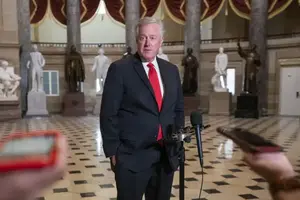
The Trump administration pushed back Wednesday (Aug 26) against widespread criticism that its staging and filming of events at the White House used as programming for the Republican convention was illegaldismissing arguments that it had violated the Hatch Act, a law intended to prevent the use of public power for private political gain.
"Nobody outside of the Beltway really cares," Mark Meadows, President Donald Trump's chief of staff, said in an interview with a news outlet.
"This is tons of hoopla that is being made about things mainly because the convention has been so unbelievably successful."
Meadows made his comments the morning after the Republican National Convention aired two official ceremonies staged earlier Tuesday on the White House groundsa pardon performed by Trump and the naturalisation of new citizens performed by Chad F Wolf, the acting secretary of homeland security, as Trump watched and chatted with them.
During the convention, Secretary of State Mike Pompeo gave a speech from Jerusalem, in an apparent violation of separate State Department rules, and the first lady, Melania Trump, delivered a speech from the Rose Garden.
Meadows also said that "you can't break the lawyou shouldn't do it," but suggested that the Hatch Act was outdated.
The White House put forward a legal theory for why both ceremonies were not Hatch Act violations, saying its role in staging them and posting videos of them on YouTube was an official act unrelated to the campaign's decision to then use the publicly available material for political purposes.
But a range of legal and ethics experts agreed that the administration was blowing through the spirit of the Hatch Act.
That law, enacted in 1939 and revised several times, imposes civil and criminal prohibitions aimed at barring officials from using their official powers to commandeer public resources for partisan political activities.
The ideals advanced by the law and related rules, like the State Department's policies, are intended to keep some government activity relatively detached from campaign politics.
That includes protecting government employees down to staff members who perform tasks like putting out chairs for White House events from being coerced into performing work to elect a particular candidate, and ensuring that American diplomats are seen abroad as speaking for the entire country.
"These activities are precisely what the Hatch Act is about," said Jonathan Turley, a George Washington University law professor who testified as a Republican witness during the impeachment of Trump.
"The president has erased these principled lines of separation between the political and governmental functions of executive officials."
Whether any of the administration's actions also clearly violated the letter of that law, or instead fell into a gray zone, was a subject of greater debate.
One part of the law makes it a crime, punishable by up to a year in prison, for federal officials to use their authority to sway elections.
Another part makes it a crime punishable by up to three years in prison to command any federal employee to perform work on behalf of candidate.
"The pardon and naturalisation ceremonies appear to be brazen violations of the criminal provisions of the Hatch Act," said Kathleen Clark, a law professor at Washington University in St Louis who specialises in government ethics.
She and Daniel Jacobson, who worked on Hatch Act issues for the Obama White House, also pointed to one of the civil portions of the law, violations of which are punishable by a reprimand or firing and exempt the president and the VP.
The passage bans most federal employees from engaging in political activity while on duty or "in any room or building occupied in the discharge of official duties."
But the White House press office denied any Hatch Act violation.
It argued that because the White House posted the videos on the YouTube channel where it routinely puts up videos of events, the Trump campaign was free to use that non-copyrighted, publicly available content for political purposes afterwards that evening.
Jacobson, however, called that a loophole, arguing that the explanation fell short if the intended purpose of staging and filming the events on Tuesday was to create material the convention could use.
"It doesn't matter if you post it firstit's your intent that matters," he said, adding that the events on display at the Republican convention were "a combination of exploiting a loophole in the fact that the president is not covered, but brazen lawbreaking by his subordinatesin particular, Chad Wolf, which was an obvious and open violation."
Turley cautioned that "as raw as this appears to most of us," in the unlikely case that charges were ever brought, the judiciary would most likely be wary of trying to parse the inherent ambiguities and blurring of the lines between official and political activities by any White House in an Election year.
For that reason, Turley added, Pompeo's speechwhich made him the first sitting secretary of state in modern history to participate in a party conventionraised a clearer set of problems, because there is no argument it had an official purpose and because it raised not just Hatch Act issues but also questions about whether it violated a stricter set of State Department rules.
A department memo from December said that "Senate-confirmed presidential appointees may not even attend a political party convention or convention-related event."
Pompeo himself signed an email to diplomatic posts the previous month stating that presidential appointees "may not engage in any partisan political activity in concert with a partisan campaign, political party or partisan political group, even on personal time and outside of the federal workplace."
The House Foreign Affairs Committee's oversight and investigations panel on Tuesday announced an oversight inquiry into Pompeo's speech.
On Wednesday, Democratic Representative Veronica Escobar said on Twitter that she had asked the Office of Special Counsel to open an inquiry into both Wolf's and Pompeo's "clear and flagrant violations of the Hatch Act."